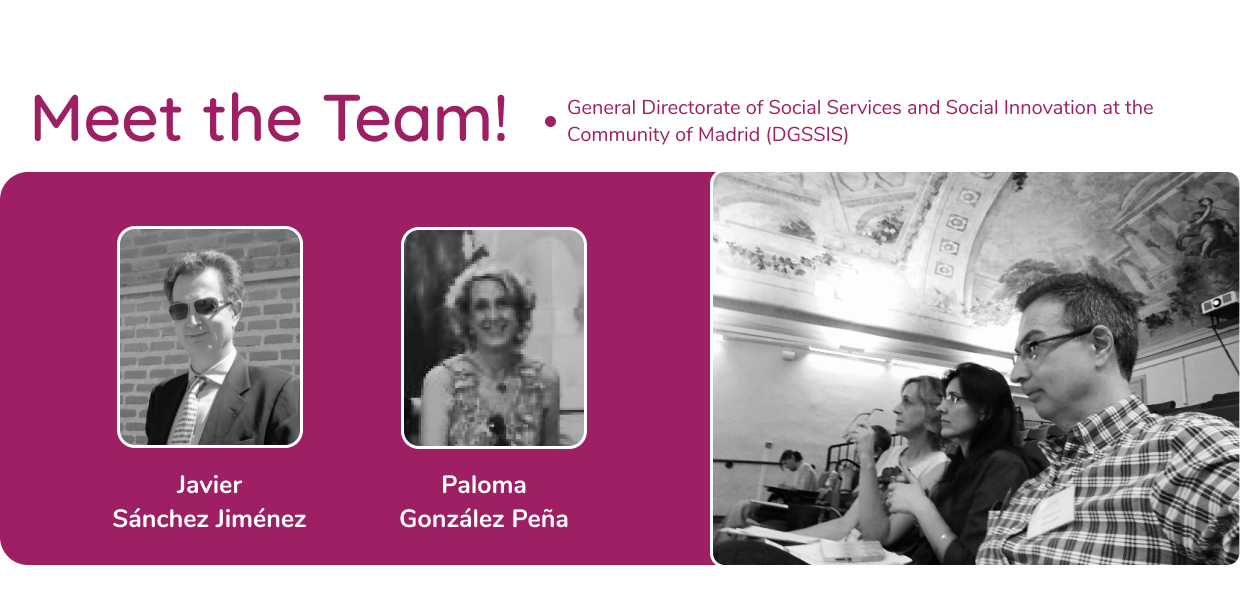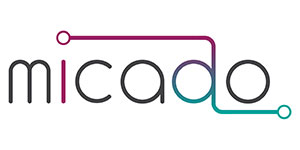
16 Jun Meet the Team – General Directorate of Social Services and Social Innovation at the Community of Madrid DGSSIS
Meet the team interview
The General Directorate of Social Services and Social Innovation at the Community of Madrid deals basically with:
-
-
- Social services:
- The organization and planning of Social Services
- The promotion of programs to address objectives and needs of social interest
- The processing and granting of the Minimum Insertion Income
- The attention of social emergency
- The allocation of places in social dining rooms in the region.
- Social inclusion: the promotion of social service policies in relation to people and groups being or at risk of social exclusion, including immigrants.
- Social innovation, volunteering and development cooperation:
- The promotion of research, knowledge management and specialized training in social innovation
- The design and development of analysis instruments to evaluate the effectiveness and social impact of programs and projects
- The promotion of volunteering
- The promotion of participation initiatives, promotion of community development, the third sector, social entrepreneurship, organized solidarity and humanitarian aid at local and global levels.
- Social services:
-
Firstly, tell us a bit about the work you do at the General Directorate of Social Services and Social Innovation at the Community of Madrid.
Javier: The development of the tasks in charge of the General Directorate is organized through its General Sub-Directorates, and I am responsible for the General Sub-Directorate of Social Inclusion. Therefore, my work is linked to the development of inclusion policies for vulnerable groups of people.
Paloma: Management of subsidies and agreements, targeting vulnerable populations and people at risk of social exclusion.
What was your motivation to developing/working in the MICADO project?
Javier: Since years the Community of Madrid offers on its website practical information relevant to immigrants residing in the region: https://www.comunidad.madrid/servicios/asuntos-sociales/informaciones-practicas-inmigrantes However, in the current globalized society it is important to coordinate this information and actions, especially at European level, which can be achieved through the MICADO Project, which also offers the possibility of exchange of experiences and good practices between the partners.
Paloma: The MICADO Project is a great opportunity to facilitate social integration for migrants, refugees, whose integration is one of the fundamental objectives of my work.
What do you think are the main challenges you will encounter during the MICADO project implementation?
Javier: In our institution, the information needed for the MICADO project app depends in many cases on other Councils, which requires coordination that is not always easy. At the same time, access to this information is controlled by unified computer services for the entire Community of Madrid to ensure the security of the computer network, which also complicates the share of information.
Paloma: On one hand, managing to overcome the technological challenges we face. On the other hand, achieving that the information included in the application is understandable and easy to use for the user, because, if so, it will surely succeed.
What do you hope to achieve by the end of the project?
Javier: Provide immigrants residing in our Community with the information that is practical for them on a mobile device, to which they have easier access than through other tools. It will be very useful for them to access the social resources that exist in a society unknown to them.
Paloma: To have generated new knowledge on the situation and needs of the migrants and refugees in the different countries that are part of the project. To be able to transfer the application to other institutions.
What do you personally find most interesting/exciting about the project?
Javier: The most interesting thing for me concerning this project is to be able to learn about other experiences developed in different countries around us, that can be useful for our public administration to improve the support to the immigrants.
Paloma: On a personal level, what I find most interesting and exciting, is achieving an instrument accessible to vulnerable people, that manages to provide access to all kinds of resources and, consequently, facilitate their social integration.
